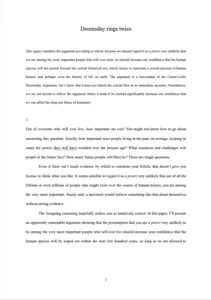Doomsday rings twice
Andreas Mogensen (Global Priorities Institute, Oxford University)
GPI Working Paper No. 1-2019
This paper considers the argument according to which, because we should regard it as a priori very unlikely that we are among the most important people who will ever exist, we should increase our confidence that the human species will not persist beyond the current historical era, which seems to represent a crucial juncture in human history and perhaps even the history of life on earth. The argument is a descendant of the Carter-Leslie Doomsday Argument, but I show that it does not inherit the crucial flaw in its immediate ancestor. Nonetheless, we are not forced to follow the argument where it leads if we instead significantly decrease our confidence that we can affect the long run future of humanity.
Other working papers
The weight of suffering – Andreas Mogensen (Global Priorities Institute, University of Oxford)
How should we weigh suffering against happiness? This paper highlights the existence of an argument from intuitively plausible axiological principles to the striking conclusion that in comparing different populations, there exists some depth of suffering that cannot be compensated for by any measure of well-being. In addition to a number of structural principles, the argument relies on two key premises. The first is the contrary of the so-called Reverse Repugnant Conclusion…
Critical-set views, biographical identity, and the long term – Elliott Thornley (Global Priorities Institute, University of Oxford)
Critical-set views avoid the Repugnant Conclusion by subtracting some constant from the welfare score of each life in a population. These views are thus sensitive to facts about biographical identity: identity between lives. In this paper, I argue that questions of biographical identity give us reason to reject critical-set views and embrace the total view. I end with a practical implication. If we shift our credences towards the total view, we should also shift our efforts towards ensuring that humanity survives for the long term.
How important is the end of humanity? Lay people prioritize extinction prevention but not above all other societal issues. – Matthew Coleman (Northeastern University), Lucius Caviola (Global Priorities Institute, University of Oxford) et al.
Human extinction would mean the deaths of eight billion people and the end of humanity’s achievements, culture, and future potential. On several ethical views, extinction would be a terrible outcome. How do people think about human extinction? And how much do they prioritize preventing extinction over other societal issues? Across six empirical studies (N = 2,541; U.S. and China) we find that people consider extinction prevention a global priority and deserving of greatly increased societal resources. …

